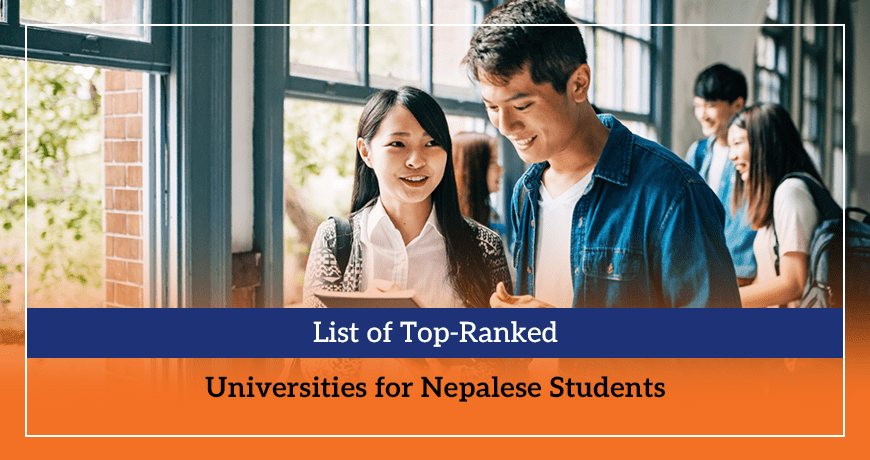

Dr Mohammad Shafiq
The allure of a world-class education, diverse cultural tapestry, and vibrant international community beckons Nepalese students seeking to elevate their academic pursuits. The United Kingdom, with its esteemed universities, renowned research facilities, and globally recognized qualifications, has emerged as a prime destination for higher education.
The trend of Nepalese students choosing the UK for their academic journey is steadily rising, fueled by aspirations for personal growth, professional development, and a transformative learning experience. In this write-up, we'll explore the nitty-gritty of study in UK from Nepal. So, let's fire away.
UK universities boast a global reputation for delivering high-quality education, with numerous institutions ranking among the top in the world. UK universities offer a dynamic and rigorous learning environment fostered by world-class faculty and cutting-edge research facilities. You'll be challenged and nurtured, pushing your intellectual boundaries and gaining crucial skills sought after by employers globally.
UK universities offer a breathtaking diversity of courses, from traditional disciplines like engineering and medicine to cutting-edge fields like artificial intelligence and renewable energy. Compared to some other famous study abroad destinations, UK programs are often shorter in duration, leading to quicker graduation and earlier entry into the workforce.
The United Kingdom allows international students to work part-time alongside their studies, gaining valuable practical experience and contributing to their living expenses. This bolsters your resume, allowing you to connect with professionals and gain insights into the UK job market.
Upon graduation, you may be eligible for the Graduate Route visa that allows you to stay in the UK for two years after your studies to seek skilled employment.

Navigating a new education system can be daunting, and understanding the grading system is crucial for setting realistic expectations and measuring your academic progress. So, let's unpack the UK university grading system, specifically focusing on the classification of honours degrees awarded to undergraduate students:
Unlike systems based solely on letter grades, the UK system combines percentages with classifications. Your final mark typically falls from 0 to 100, although some universities use 0 to 70)—each range corresponding to a specific degree classification.
These prestigious classifications indicate a level of academic excellence achieved in your overall program. Here's a breakdown of the major categories:
Embarking on a UK study adventure requires careful planning, and understanding the financial implications is crucial. Let's break down the key cost factors to ensure you're well-equipped for your academic journey:
The total cost to study in UK from Nepal typically ranges from £19,360 to £62,160 per year, including tuition and living expenses, varying by program, university, and lifestyle.

Leaping to study in the UK requires meeting specific entry requirements. Here's a breakdown of what Nepalese students need to know about academic requirements:
Undergraduate:
Postgraduate:
The journey to studying in the UK starts with a well-defined application process. Let's navigate the key steps to ensure a smooth and successful submission:
While navigating the application process independently is possible, seeking expert guidance can streamline your journey and maximize your chances of success. BHE UNI, known as the best consultancy in Nepal for UK education, offers invaluable support, including:

The most common visa for international students seeking higher education in the UK.
Valid for the duration of your studies, with options to extend.
Requires:
Equipping yourself with strong English language skills is essential for success in your academic pursuits in the UK. Universities utilize various standardized tests to assess your proficiency, with the IELTS being the most widely accepted.
The minimum IELTS score requirement varies based on the university, program level, and subject areas. However, here's a general guideline:
The UK boasts a nationalized healthcare system called the National Health Service (NHS). It means that the government provides most essential medical care and is free at the point of use for eligible individuals, including:
You are automatically eligible for the NHS if you hold a Tier 4 (General) student visa valid for six months or longer. You must pay an Immigration Health Surcharge (IHS) for your visa application. It grants you access to NHS services.
Upon arrival, register with a local GP to access essential healthcare services. It includes regular checkups, prescriptions, and referrals for specialist consultations. While most essential services are free, some costs, such as prescription charges for certain medications and dental or optical treatments, might apply.
It is the main intake for most UK universities, starting in September or October. It is the most popular intake, with the widest range of courses available.
This intake starts in January or February and is offered by fewer universities. It is a good option for students who miss the autumn deadline or who want to start their studies later in the year.
This intake starts in April or May and is offered by an even smaller number of universities. It is a good option for students who want to finish their studies in a shorter timeframe or who want to take advantage of the summer weather in the UK.

One of the most prestigious universities in the world, Oxford has a wide range of undergraduate and postgraduate courses in various subjects. The university has a strong reputation for research and teaching, and its graduates are in high demand from employers worldwide.
Another world-renowned university, Cambridge, offers a range of courses similar to those at Oxford. The university is well-known for its collegiate system, providing students with a close-knit community and a supportive learning environment.
Imperial College London is a leading science and technology university known for its engineering, medicine, and natural sciences research.
UCL is a world-renowned university located in the heart of London. It offers various undergraduate and postgraduate courses in a variety of areas, including humanities, social sciences, and sciences. UCL is known for its innovative research and its commitment to social justice.
LSE has undergraduate and postgraduate economics, politics, law, and other social science courses. LSE is known for its rigorous academic standards and focus on real-world issues.
Funded by the UK Foreign, Commonwealth, and Development Office (FCDO), these prestigious scholarships support full-time postgraduate study in any subject at any UK university. Open to outstanding mid-career professionals with leadership potential.
Funded by the UK Department for International Development (DfID), these scholarships support postgraduate study in various development-related fields. Open to citizens of Commonwealth countries, including Nepal.
Funded by the British Council and partner organizations, these scholarships support postgraduate study in specific priority subjects, including science, technology, engineering, and mathematics. Available to citizens of selected countries, including Nepal.
Offers a variety of scholarships for international students, including the Gates Cambridge Scholarships and the Jardine Scholarships.
Offers a variety of scholarships for international students, including the President's International Scholarships and the Science Master's Excellence Scholarships.
Offers a variety of scholarships for international students, including the UCL Excellence Scholarships and the Mastercard Foundation Scholars Program.
The following are 10 of the most sought-after courses for Nepalese students in the UK:
Here are some UK universities with significant Nepalese student communities, along with some details about each:
London hosts the largest Nepali population in the UK and offers diverse cultural experiences. You'll find ample opportunities to connect with your heritage, from community centres like Khukuri House to restaurants specializing in momos and thali sets.
Home to the Gurkha Memorial and Museum, Reading hosts various cultural events like the Gurkha Festival, celebrating Nepalese traditions and honouring Gurkha contributions.
With a sizeable Gurkha community, Aldershot hosts Gurkha bhajans (worship gatherings) and cultural celebrations, fostering a strong sense of community.

Yes, the UK offers a high-quality education, diverse programs, and a welcoming Nepali community. Research your interests and consider the cultural aspects too.
As of May 2024, students from Nepal applying for a UK student visa need to demonstrate they have sufficient funds to cover their tuition fees and living expenses. For living expenses, the requirement is £1,334 per month for up to 9 months if studying in London, amounting to £12,006. For courses outside London, the requirement is £1,023 per month, totalling £9,207 for a 9-month period. These funds must be held in a bank account for at least 28 consecutive days, with the closing balance date within 31 days of the visa application (GOV.UK) (GOV.UK).
Costs vary depending on the university, program, and location. Tuition fees typically range from £10,000 to £40,000 per year, and living expenses can range from £12,630 to £33,000 per year.
Specific requirements vary, but most universities require a minimum GPA of 3.0. Check individual university websites for details.
Yes, you can study in the UK from Nepal without IELTS. Many UK universities accept alternative English proficiency tests like TOEFL, PTE Academic, or Cambridge English exams. Some universities consider high school English marks or offer pre-sessional English courses to meet language requirements. Universities such as the University of Essex, London South Bank University, and the University of Bristol are known for these options.
As of May 2024, students from Nepal seeking to study in the UK are required to pay NPR 84,498 for a standard Student or Child Student visa. For those interested in a short-term study of the English language for a duration between 6 to 11 months, the visa fee is NPR 34,489. These fees apply to both main applicants and their dependants.
As of May 2024, there are approximately 80,000 to 100,000 Nepali students in the UK, drawn by the country's prestigious universities and diverse educational opportunities.
Yes, there are pathways to permanent residency after studies, but meeting specific eligibility criteria and requirements is essential.
The UK presents a gateway to academic excellence, cultural immersion, and personal growth for Nepalese students. Your study in UK from Nepal journey starts with careful planning and thorough research. Utilize the resources provided, connect with experienced professionals, and confidently embark on your enriching academic adventure in the UK.

November 19 2024

November 17 2024

November 13 2024
Author: Dr Mohammad Shafiq
Business Study is undoubtedly a popular subject worldwide. Studying it in the UK makes it even better. The UK’s business schools have always had... Read More
Author: Dr Mohammad Shafiq
Thinking about doing an MS in the USA? It’s a popular choice for students worldwide. The country is home to some of the best institutes worldwid... Read More
Author: Dr Mohammad Shafiq
Are you an international student or professional eyeing a permanent residency (PR) visa in New Zealand? If so, choosing the right course can significa... Read More